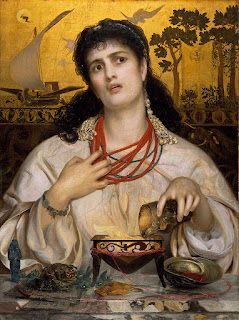- appreciate more the goods we have
- experience suffering w/o having to go through it ourselves
- purge ourselves of the tension of bad emotions
Thus it brings us to a better place by instilling in us
- self-knowledge
- the sense of pity
- gratitude
Thus it brings us to a better place by instilling in
us
In short, wisdom.
All education & art (perhaps all life) should be geared toward wisdom; a greater knowing of ourselves - gnothi seauton, as the Greeks said. Tragedy accomplishes this by allowing us to suffer vicariously without actually suffering;
"drasanta pathos, pathei mathos"
"the experience causes suffering, the suffering brings wisdom"
The First Sufferer of the tragedy, the proto-agonist, is one with whom we identify, allowing the drasanta to occur. Normally a human actor, used to be a goat (or a lamb). In the Ancient World the little goat would be painted, covered in ribbons and notes about the sins or sufferings of the village, and sacrificed (thrown off a cliff or eviscerated).
In tragedy we are encouraged to see the other as ourself, appreciate more our own blessings, become more aware of the sin and devastation we have caused. Sure it is sad, and it ought to cause us pain and sorrow even knowing that eventually the pain will pass over like a storm and be gone; but the point is that we fully enter into the mystery, not gloss over it with platitudes and self-congratulating affirmations; "there is offense, Horatio, and much of it."
We have to experience the Tenebrae facta sunt if ever we are to really appreciate the Haec est dies. And even though we rejoice that the pagan message of the goat song was christened by the "Christos anesti", still we have to experience the storm in all its rage, dying to ourselves that we might truly live.

